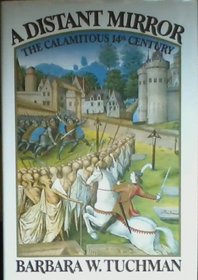Search -
A Distant Mirror: The Calamitous 14th Century
A Distant Mirror The Calamitous 14th Century
Author:
The 14th century gives us back two contradictory images: on the one hand a glittering time of crusades and castles, cathedrals and chivalry and exquisitely illuminated Books of Hours; on the other, a time of ferocity and spiritual agony -- a world plunged into chaos. These are the years when the Black Death struck in the great plague of 1348-50,... more »
Author:
The 14th century gives us back two contradictory images: on the one hand a glittering time of crusades and castles, cathedrals and chivalry and exquisitely illuminated Books of Hours; on the other, a time of ferocity and spiritual agony -- a world plunged into chaos. These are the years when the Black Death struck in the great plague of 1348-50,... more »
ISBN-13: 9780307291608
ISBN-10: 030729160X
Publication Date: 1978
Pages: 654
Rating: 2
ISBN-10: 030729160X
Publication Date: 1978
Pages: 654
Rating: 2
3.5 stars, based on 2 ratings
Genres:




